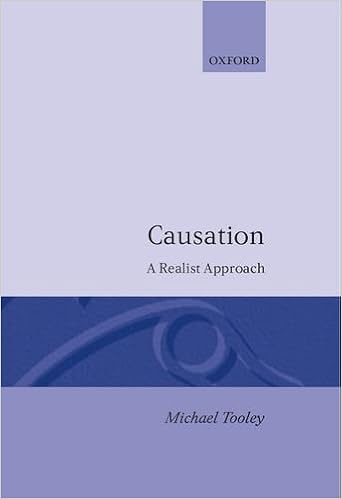
By Nick Bostrom
Anthropic Bias explores the way to cause for those who suspect that your proof is biased through "observation choice effects"--that is, proof that has been filtered by way of the precondition that there be a few certainly situated observer to "have" the proof. This conundrum--sometimes alluded to as "the anthropic principle," "self-locating belief," or "indexical information"--turns out to be a shockingly puzzling and intellectually stimulating problem, one abounding with very important implications for lots of parts in technological know-how and philosophy.
There are the philosophical idea experiments and paradoxes: the Doomsday Argument; slumbering good looks; the Presumptuous thinker; Adam & Eve; the Absent-Minded motive force; the capturing Room.
And there are the functions in modern technology: cosmology ("How many universes are there?", "Why does the universe seem fine-tuned for life?"); evolutionary concept ("How unbelievable used to be the evolution of clever lifestyles on our planet?"); the matter of time's arrow ("Can it's given a thermodynamic explanation?"); quantum physics ("How can the many-worlds conception be tested?"); game-theory issues of imperfect keep in mind ("How to version them?"); even site visitors research ("Why is the 'next lane' faster?").
Anthropic Bias argues that an analogous rules are at paintings throughout most of these domain names. And it deals a synthesis: a mathematically particular concept of remark choice results that makes an attempt to satisfy medical wishes whereas steerage away from philosophical paradox.
Read or Download Anthropic Bias: Observation Selection Effects in Science and Philosophy (Studies in Philosophy) PDF
Similar Epistemology books
What Is Your Dangerous Idea?: Today’s Leading Thinkers on the Unthinkable (Edge Question Series)
The world's top clinical thinkers discover daring, awesome, perilous rules that may switch our lives—for larger . . . or for worse . . . From Copernicus to Darwin, to current-day thinkers, scientists have consistently promoted theories and unveiled discoveries that problem every thing society holds pricey; principles with either confident and dire results.
From Abdullah to Hussein: Jordan in Transition (Studies in Middle Eastern History)
This publication examines the main turbulent interval within the historical past of Jordan's ruling condo, the six years following the assassination of the kingdom's founder, Abdullah (1951-1957). these years witnessed the country's lone episode of susceptible monarchy, whilst the king--the beginner Hussein or his ill-starred father, Talal--was no longer the preeminent political actor within the land.
The Varieties of Reference (Clarendon Paperbacks)
Gareth Evans, probably the most tremendous philosophers of his iteration, died in 1980 on the age of thirty-four. He have been operating for a few years on a e-book approximately reference, yet didn't entire it ahead of his dying. The paintings used to be edited for booklet by way of John McDowell, who contributes a Preface.
Tooley the following units out and defends realist money owed of conventional empiricist reasons of causation and legislation of nature, arguing that because reductionist debts of causation are uncovered to decisive objections, empiricists needs to holiday with that culture.
Additional info for Anthropic Bias: Observation Selection Effects in Science and Philosophy (Studies in Philosophy)



